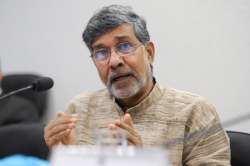‘Note ban inefficient in curbing human trafficking, Rs 2,000 notes also being pushed into it’ says Kailash Satyarthi
Nobel Laureate Kailash Satyarthi has expressed his disappointment saying that he had expected that demonetisation would restrain human trafficking but no significant effort has been seen yet.

Nobel Laureate Kailash Satyarthi, who had earlier said that scrapping high-denomination currency notes would curb child trafficking, has now expressed his disappointment saying that he had expected that demonetisation would restrain human trafficking but no significant effort has been seen yet.
“I'd expected black money-driven human trafficking would be crippled completely following demonetisation. But no significant effort is being seen on ground,” Times of India quoted Satyarthi in its report as saying.
“Demonetisation is a way, and not the end in itself for checking trafficking,” he added.
Prime Minister Narendra Modi, during an election rally in December, had asserted that demonetisation has destroyed human trafficking, terrorism, drug mafia and underworld in one blow.
The report cited Satyarthi saying that Rs 2,000 notes are being gradually pushed into human trafficking. He further stressed that government should make serious efforts to guard against this.
“Black money, corruption and trafficking is a vicious circle and the scourge needs to be dealt with iron hand,” he said.
Satyarthi, who had won the 2014 Nobel Peace Prize jointly with Pakistani schoolgirl Malala Yousafzai, had earlier said that human trafficking and child labour were amongst the largest sources of black money.
Satyarthi has waged a war on child labour and trafficking through his movement ‘Bachpan Bachao Andolan’. His NGO is credited with rescuing more than 80,000 enslaved children.
In five years, the NGO has rescued over 5,000 children across the country of which more than 2,000 were rescued from Delhi. Of these, nearly 3,000 children were below 14 years and 21 per cent of them were working with their families.
Further lamenting that there was no strict law in the country to fight human trafficking, he said, “The law should be victim- or survivor-friendly with a proper redressal mechanism.”
Last year, the Child Labour (Prohibition and Regulation) Amendment Bill, 2016, which was cleared by the Parliament, inviting sharp criticism from Satyarthi. He had then said that the new law will open a back door for large number of children to enter the workforce and even calling the new bill a ‘missed opportunity’.